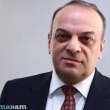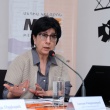The Role of External Factors in the Karabakh Process - 2018: Mediators, Regional Actors and International Organizations
On June 26-27 an online conference “The Role of External Factors in the Karabakh Process - 2018: Mediators, Regional Actors and International Organizations” was held on the Public Dialogues website (www.publicdialogues.info). The conference was organized within the framework of the “Public Dialogues for Communication between Armenian and Azerbaijani Specialists” project, implemented by the Region Research Center.
The project is supported by the Black Sea Trust for Regional Cooperation, German Marshall Fund.
The project partner is the Institute for Peace and Democracy (the Netherlands). The "Public Dialogues" website was created in 2012 by the Region Research Center and the Institute for Peace and Democracy which operated in Azerbaijan at the time.
Who participated in the discussion?
Arman Melikyan (Armenia) – Ambassador Extraordinary and Plenipotentiary of RA, Ex-Minister of Foreign Affairs of NKR
Andrey Areshev (Russia) – Expert at the Strategic Culture Foundation, Research Fellow at the Centre for Central Asia and Caucasus Studies
Rauf Mirkadyrov (Switzerland) – journalist
Vyacheslav Mamedov (The Netherlands) – journalist, public figure
The conference was moderated by Laura Baghdasaryan (Armenia) - Director of Region Research Center
What issues and aspects were discussed?
• The probability of the resumption of hostilities in the Karabakh conflict zone after the April clashes,
• Possible scenarios of developments, should the military clashes unfold: the recognition of the NKR by Armenia and the reaction of other countries, the degree of probability for the application of a “coercion to peace” mechanism in the present layout of international developments,
• The probability of opening a second front in Nakhijevan as a possibility for achieving military advantage, as well as leverage upon such countries as Turkey and Russia which in these circumstances would already have to enter a military confrontation with one another,
• The impact of the wave of violence and the wars in Syria and the Middle East on the situation around the Karabakh conflict,
• The levers of regional actors and official mediators to prevent, or, on the contrary, to push for the realization of this scenario,
• Informal signals and backstage arrangements with the parties of the conflict,
• The objective of the prevention of the most negative scenarios, which of the external actors can resolve it,
• Bellicose rhetoric as a topical element of the policies pursued by the parties of the conflict, aggressive rhetoric directed not only to the opposite party, but also countries for whom the military outbreak in the Karabakh zone is not beneficial either,
• Supply of arms to the parties of the conflict as a tool of political influence and business,
• The problem of long-term unanimity of the Karabakh conflict mediators in the context of international tension and turbulence,
• The susceptibility of external actors to the arguments of the parties of the conflict upon the unfolding of military operations and the attempts of political solution,
• Resources available for the political solution to the conflict,
• Coalitions Russia, Azerbaijan, Georgia, Iran, Turkey are affiliated with and the Karabakh conflict,
• Probability of concluding a military alliance between Turkey and Azerbaijan.
“The Role of External Factors in the Karabakh Process - 2018: Mediators, Regional Actors and International Organizations”
Excerpts from online conference materials (June 26 - 27, 2018)
The complete texts of conference materials are available at http://www.publicdialogues.info/node/777).
On the Sustainability of Consensus between Russia and the West in the Zone of the Karabakh Conflict
Vyacheslav Mamedov-The war in Karabakh will be extremely unpopular with the key players on the international arena. That is why it will be impossible for either Armenia or Azerbaijan to enjoy international support, should there be a military escalation. Within the framework of the OSCE Minsk Group activities, Russia and the USA have arrived at a rare unanimity on the methods of the resolution of the Karabakh conflict. These are the methods of peace and compliance. These countries are currently spending colossal intellectual and financial resources along the Syria - Ukraine - Sanctions axis and in a number of less significant vectors as well. Simply there are no resources to provide the parties of the potential conflict in Nagorno Karabakh with economic and political support. I would say the Turkish factor is an exaggeration if viewed as a factor to push the war forward in Karabakh. Turkey is facing more serious problems with the Kurdish extremism and the war in Syria.
Arman Melikyan - In my opinion, in the upcoming six to twelve months, it is most probable that very little will be left from the former placable unanimity of the mediators... At some point in the future, the American-Iranian confrontation may lead to a new spark of hostilities in the Karabakh conflict zone. That is to say, the resumption of an armed conflict may act as a detonator for the destabilization of the situation in the Northern and North-Eastern provinces of the IRI and vice versa. In case of such developments, it would be hardly possible to maintain the unanimity, currently present among American and Russian co-chairs, for the strategic goals of these superpowers are just too contradictory to each other. If Washington prioritizes the overturn of the theocratic regime ruling in Iran, Moscow regards cooperation with this very regime as a certain guarantee to ensure and promote its own military, political and economic interests in South Caucasus, and partly, in Middle East, too. However, it is obvious that only time will show which direction things will truly develop in.
On the Recognition of the Independence of the NKR by Armenia in Case of War Scenario and the Reactions of the International Community
Andrey Areshev - It is common knowledge that the issue has been discussed in Armenia multiply, and the third president has explained many times why Yerevan refrains from doing it (right after the “four-day war”, too). I assume that the position of the Armenian diplomacy on the issue of the recognition of the Artsakh Republic will hardly change. In addition, I cannot see whether this recognition will happen in case of the resumption of hostilities...
Arman Melikyan - In case of the resumption of large-scale hostilities on the contact line of the military forces in the conflict zone, it is quite probable that Armenia will recognize the independence of the NKR/Artsakh Republic. In this context, the statements made by the Prime Minister of Armenia that he considers the return of Stepanakert to the negotiations table as beneficial for the rapid achievement of a mutually acceptable solution may be viewed as a warning that such a scenario may be employed. At that, not only in case Azerbaijan attempts to impose a military solution of the problem. In fact, he underlines very specifically that President Ilham Aliyev is entitled to represent all the citizens of Azerbaijan at the negotiations, including those who used to reside in Shushi or Kerkejan; whereas he himself does not have a right to act on behalf of the Armenians in Artsakh – the population of Artsakh is not his electorate and have not granted him with such an authority.
Rauf Mirkadyrov - I would believe in the pacifism of my opponents if they pointed, with similar consistency, at the need to liberate all the occupied territories around Nagorno Karabakh and ensure the return of the displaced persons to their permanent residences. Naturally, after the provision of international guarantees of safety for the Armenians in Nagorno Karabakh because in the present manner it is just “profitable” pacifism. In simpler terms, it is propaganda. Moreover, this makes an impression that Armenians are all so very peaceful and gentle, while Azerbaijanis are war-loving barbarians. Finally, the protection of sovereignty and territorial integration are not just norms of the international law, but also an obligation assumed by every government before its people. That is why no government can proclaim refusal from the military scenario of liberating occupied territories in a situation when 24-year peace negotiations have not yielded any fruit.
By the way, it is not an established fact that large-scale military activities will be launched.
On the Probability of “Coercion to Peace” in Case of a War
Rauf Mirkadyrov - It should be mentioned right away that the so-called “Collective West” as a whole cannot in any way hinder the resolution of this conflict after the military scenario, especially if we mean temporal restrictions. The “collective West” - NATO in general, and such leading states as the USA in particular – do not have a military presence in our region, and as a consequence to this, do not avail of tools for “coercing peace” over the parties of the conflict. On the one hand, this is an extremely negative factor, for the very simple reason that in the region there is no military and political balance established by the leading global players, and primarily between Russia and the USA. However, the lack of a military and political presence removes any liability for any probable development after the military scenario from the West in general, and the USA in particular. That is why the West could “turn a blind eye” to the attempts of the military resolution of the conflict, if actions are short-term and do not go along with criminal acts against the peaceful population. Many diplomats representing the leading Western states in Baku have made many explicit references to this point in private conservations with the author of these lines.
Thus, from among the leading geopolitical players only Russia has a military and political presence in the region, hence, “the tools for peace coercion” onto the parties of the conflict. Thus, only Russia can contribute or hinder the resolution of the conflict after the military scenario.
Andrey Areshev - Considerations on something like “Dayton” (city in Ohio State in USA) for South Caucasus have been voiced, at least, at the expert level. From time to time, considerations have been voiced on the composition of a foreign contingent, potentially to be deployed in the region of the Nagorno Karabakh conflict. If I am not mistaken, the countries of Visegrad Group were mentioned in this context, however, it all died out. In addition, Iran consistently spoke against foreign presence along the perimeter of its borders. Baku’s agreement to such an operation would be difficult to imagine, too. Hence, as of now I am inclined to think that this is not a topical issue, even in the case of military escalation. This is an extremely complicated operation, also from the viewpoint of legal, organizational, and technical arrangement.
Arman Melikyan - Today even if Baku does dictate the conditions for deploying Russian military contingent, it demands the presence of the Russian forces. What would you say to such an option: the whole territory around the currently abolished administrative borders of the former Autonomous Region of Nagorno Karabakh, with the exception of Berdsor/Lachin region, will be transferred in this manner or other under the control of the Azerbaijani military forces and administration, and the Russian peace-keeping contingent will be deployed in the remaining territory controlled by Stepanakert. At the same time, the status of the region, still populated by Armenians, will remain undetermined and will not become part of Armenia by any means. I think that Baku will be happy to agree to such an intermediate solution, because will only be the launch of the process. Taking into consideration the tendency of decreased and in certain parts of the post-Soviet space completely neutralized Russian influence, in ten-fifteen years’ time Azerbaijan may have a chance to “internalize” what will be left behind after the “voluntary, yet forced” withdrawal of the Russians.
Vyacheslav Mamedov - If we are to look at the international practices of “coercion to peace”, it is quite a lengthy procedure, requiring the resolution of the UN Security Council. This measure has not yet been fully applied to the parties of the conflict, for in case of “peace coercion” both the arms and military infrastructure of the conflicting parties, as well as the militia of conflict participants may be destroyed. Since these are truly extreme measures, they require for the resolution of the Security Council.
But since Russia is connected with Armenia and Azerbaijan within the CSTO and CIS, such radical means will never be applied even in case of a full-scaled war. That is why Russia’s actions have been much closer to what the term “peace maintenance” denotes. I am convinced that Russia will continue to make use of this very option to restrain the participants of the conflict.
But, certainly, both peace maintenance and a military action for the sake of “peace coercion” may be viewed only as temporary measures and cannot replace a full negotiations dialog to resolve the issue.
Rauf Mirkadyrov - I agree with Mr. Mamedov in the sense that it (the organization and implementation of a peace coercion action - Editor) is a lengthy procedure. Moreover, almost all of us have agreed that the war will be short and quick. That is to say, they will not manage to discuss and make a decision. I would like to remind that even during the so-called April war (2016 - Editor.) the issue was even included in the agenda of the UN Security Council regardless of the local significance of these military actions. Secondly, in the conditions of the present geopolitical reality and given the interests of global players, primarily those of Russia and the USA, such a consolidated response is not possible at all. Russia and Iran are not interested in the appearance of non-regional forces in this region. They did not manage to achieve a complete agreement on this issue even in mid 1990s. Theoretically, Russia, Iran and Turkey can promptly react to the situation. Iran will not go for it. It already has more than enough. An attempt of a military intervention will become an appropriate occasion for striking Iran.
Turkey, regardless of its alliance with Azerbaijan, will also hardly introduce its forces into the conflict zone. This will provoke a war between Russia and Turkey. In addition, this is something Turkey does not want. Take a closer look on the map. A large-scale troops deployment is possible across the territories of Iran, Georgia and Armenia. Iran will not agree to this. Deployment of forces across Armenia is an intervention, leading to a war with Russia. Russia will not leave this unanswered, even if Turkey tries to deploy its forces across Georgia. Yet, the most important factor is that Turkey is afraid of a war with Russia. Mind it, Turkey has not yet dared to establish military bases in Azerbaijan.
Alliances with the Participation of Russia, Azerbaijan, Georgia, Turkey, Iran and the Karabakh Conflict
Andrey Areshev - I assume that potential alliances will be situational in nature and will be dictated by the necessity to solve emerging problems, often in the urgent mode. Such is our complicated reality; tactical maneuvering does not give any chance for the formulation of long-term goals and conceptualization of mechanisms for their achievement (and it is a serious question whether this is attainable at all in the conditions of narrowing national jurisdictions in favor of global cross-border players). The potential cooperation between Iran, Azerbaijan and Russia is conditioned by the widely known project of the International North-South Transport Corridor; at the same time, Azerbaijan is also involved in other “latitudinal” energy communications projects, which undoubtedly are of higher significance. Instability in the Middle East is truly expanding towards Iran and the South Caucasus (we have had multiple occasions to write about this), instilling serious apprehensions, also within the context of the Karabakh conflict... The trilateral cooperation among Turkey, Azerbaijan and Georgia may have the most significant impact on the Karabakh conflict, and it just takes a look on the map to answer the question: “Why?” The other formats of bi- and multilateral influence are subject to the solution of individual problems or the development of individual projects that are not immediately related to the Karabakh issue.
Vyacheslav Mamedov - If we focus on alliances that have formed recently, only one of them has been very active, namely Russia - Turkey - Iran. However, this rather strange alliance was created exclusively to solve an array of issues to end the war in Syria. No more than that. That is why I am convinced that after the war in Syria ends, this alliance will fall apart. By and large, in the future when real efforts will be invested for the resolution of the Karabakh issue, other alliances we cannot yet predict the composition and the members of will be created, given the strong turbulence in international relations and the degree of uncertainty in the future relations between and among countries. The only thing to be said is that Russia will definitely be a party to these alliances.
Arman Melikyan –The Baku - Tbilisi - Ankara alliance was formed quite a while ago and has been successfully promoting joint political, economic, transportation, logistics, and military projects, among other things. The Moscow-Baku-Tehran alliance is at the formation stage and has so far predominantly focused on economy and transport. Besides, there is a special point of joint interests - the status of the Caspian. We can also speak of a certain informal alliance in the Moscow-Ankara-Tehran format which, along with issues of cooperation, considerably focuses on overcoming disagreements among its members that constantly arise in the Middle Eastern and South Caucasian space. I would qualify Baku’s success in firmly establishing itself as a key link along the East - West and North - South axes as a significant political and diplomatic achievement. This has so far granted Azerbaijan quite an ample space for political maneuvers.
On the Resources of Conflict Resolution
Andrey Areshev - It is necessary to tell the primary from the secondary; this complicates the situation, also in relation to regional conflicts, and makes the situation not quite linear. There was a time when they said that contradictions between Armenia and Azerbaijan could be partially alleviated should they both be members of the Eurasian Economic Union. However, the current state of this structure leaves no room for illusions. By the way, the EU is not in a better state and is hardly ready to assume any serious obligations in the Caucasus. The fragmentation of the post-Soviet space continues, Russia is not an exclusive player here, capable of dictating anything to anybody. In fact, this is not needed. The elites of the former Soviet republics that have escaped the “firm embraces of the Empire” are sacredly cherishing the achieved independence, and in parallel, they search for and find other partners. Some even succeed in finding protectors. It is a different issue how effective all this is, but in the case of Nagorno Karabakh I cannot see any external resources and possibilities for imposing an effective resolution scheme onto the parties. It seems all the participants of this discussion are more or less unanimous on this point.
Vyacheslav Mamedov - The presidents cannot sign any agreements, without public consensus in Armenia and Azerbaijan over at least the initial and most basic principles of the resolution of the Karabkh conflict. Otherwise, the societies will react with mass protests and unrests, the opposition will become active, barricades will be erected... However, all this takes very serious diplomatic resources both in terms of leadership in all actions, as well as the development of concrete recommendations. At the current stage, unfortunately, all the resources of key actors are spent on activities targeting the most acute problems. In this context, I believe that the normalization of relations between Russia and the USA at least in a number of directions is exceptionally important. It will allow to redirect talented (mind it, talented) diplomats towards the resolution of the Karabakh conflict. In order to understand the severity of lack of resources, I would like to quote the example of the Russian Embassy in the Netherlands. A trusted and close source informed that 80% of the diplomatic staff, including the culture attaché, are currently busy developing methods for fighting against the “pro-American lobby” in the OPCW. And there is neither energy nor time for other topics...
Rauf Mirkadyrov - The international community practically has no resources for the resolution of the conflict. At least, as long as there is a tough geopolitical confrontation among leading global players. Only Russia can achieve a “lucrative” resolution of the conflict “on its own”, that is, by means of threats, blackmail, and direct military and political pressure, at least at the present stage. Various scenarios may be drawn up.
A few words on internal resources. The so-called blackmail, in simpler terms, the threat of war is also a type of a resource. People shall never forget about the threat of war. Even Mr. Kazimirov admitted back then that the agreement on ceasefire was “open ended, but not eternal”. People shall always remember that the maintenance of the existing status quo will lead to a large-scale war sooner or later. This is a serious stimulus for responsible politicians.
The loss of independence can also become a serious stimulus. Yes, I fully agree with Andrey Areshev on the point that our leaders, even Pashinyan who took over the steer-wheel literally only yesterday, would not want to become, in the best case scenario, the Governor of a Russian province. It is pleasant to be the master of all, even in a place so small on the map that cannot fit the name of the country. But, as they say, you don’t bring a knife to a gunfight. And neither Azerbaijan nor Armenia have a gun.
I hope that this threat will force the leaders of Azerbaijan and Armenia to demonstrate political will, go for direct negotiations without mediators and arrive at some compromises.
Arman Melikyan - I think it is important to define what the resolution of the conflict looks like to the conflict parties, interested regional superpowers and mediators. The parties to the conflict in the best-case scenario have discordant (Yerevan and Stepanakert), and in the worst-case scenario - diametrically opposite approaches (Baku and Stepanakert). Before the change of power in May 2018, Yerevan considered the “territories in exchange for status” formula an acceptable option according to which territories, situated to the east and south of the currently abolished borders of the former Autonomous Region of Nagorno Karabakh could be transferred to Azerbaijan’s control. Azerbaijan would acknowledge the right of the people of Artsakh to the independent determination of the status of the province. Baku refuses to acknowledge this right of the citizens of Artsakh, however, it is ready to receive the above-mentioned territories in exchange for guarantees of reducing military activity along the contact line. An option of self-determination is being considered in Baku for the population of Artsakh within the frames of territorial integrity or sovereignty within Azerbaijan. Stepanakert (which does not have any direct participation in the negotiations) believes that the issue of Artsakh’s status has been resolved by means of self-proclamation, and the issue of territorial demarcation with Azerbaijan is considered in the context of potential exchange of formerly Armenian-populated territories currently under Azerbaijan’s control with some territories, previously populated by Azerbaijanis and currently under the control of the Artsakh authorities. Roughly summarizing what has been said, we can characterize the positions of the parties as follows:
Baku wants to bring the situation with the status and territories to the pre-conflict state, Stepanakert wants to reinforce the situation formed as a result of the 1991 - 1994 war de jure, whereas Yerevan is proposing to agree to a certain mix of the positions of Baku and Stepanakert. The regional superpowers are concerned that this or that resolution does not affect their own interests, have a negative impact on their military, political and economic interests, and diminish their security.
To a certain extent, mediators consider the final settlement in the context of their own mid-term and long-term interests in the Middle East, South Caucasus, and Central Asia. Meanwhile, the principles of the resolution proposed to them are contradictory to each other and are counterposed by the parties to the conflict; a theoretical struggle is taking place to define the prevalence among the principles from the viewpoint of the international law. A completely fruitless occupation.
Please read the full material of the internet conference in Russian here:







